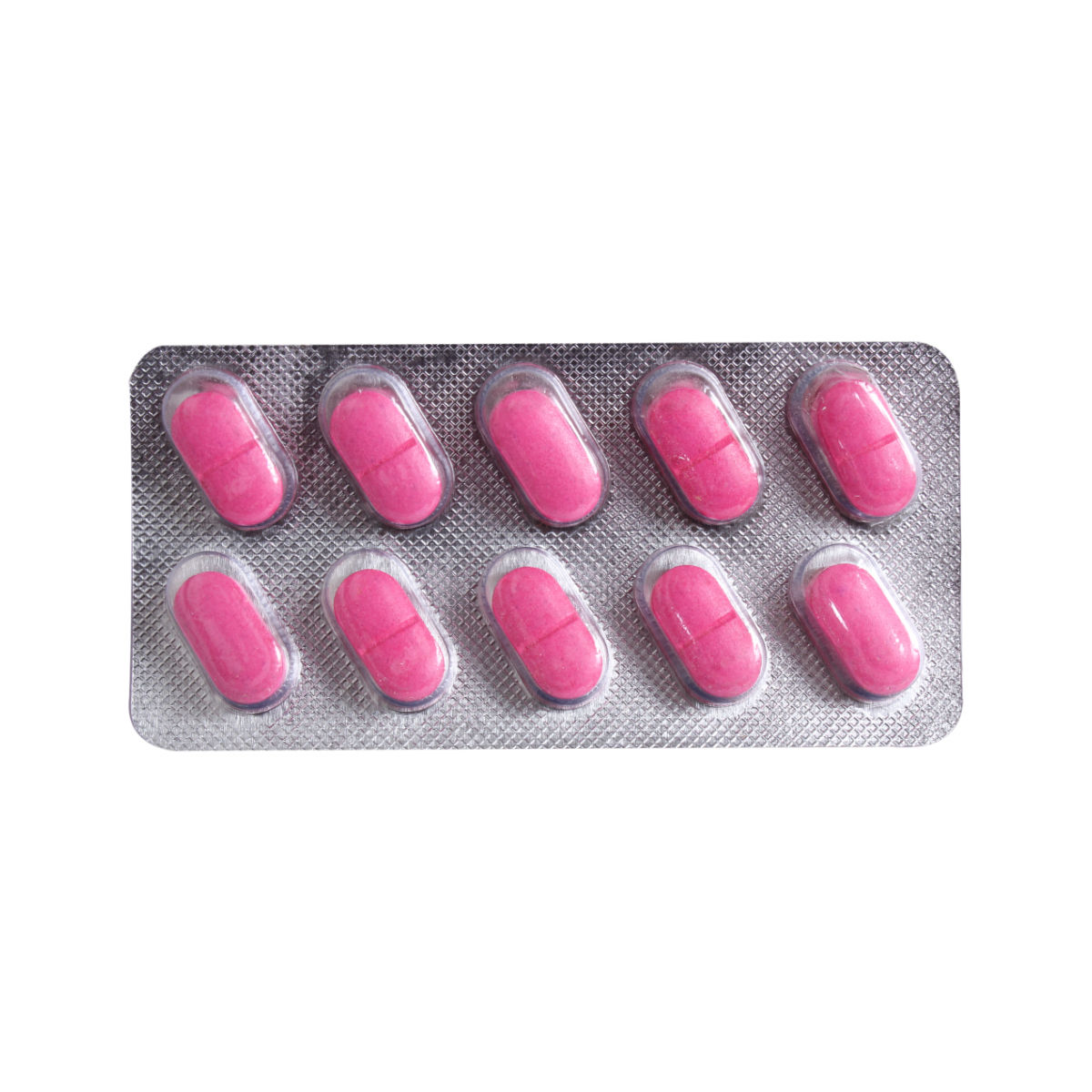Painout S 100mg/500mg/15mg Tablet
Painout S 100mg/500mg/15mg Tablet is used to reduce pain and inflammation due to bone or soft tissue injury, resolution of postoperative inflammation, oedema (swollen tissue with fluid) and pain. It works by blocking the action of an enzyme known as cyclo-oxygenase (COX), which causes pain and swelling in the injured or damaged tissue. Also, it helps in the breakdown of a protein (fibrin) which is formed as a by-product of the blood clot at the site of injury. Thus, it causes thinning of the fluids around the injury site, thereby making fluid drainage smoother in the swollen tissue. It may cause common side effects such as nausea, vomiting, indigestion, stomach pain, etc. Before taking this medicine, you should tell your doctor if you are allergic to any of its components or if you are pregnant/breastfeeding, and about all the medications you are taking and pre-existing medical conditions.
₹54*
MRP ₹60
10% off
₹51*
MRP ₹60
15% CB
₹9 cashback(15%)
Free Delivery
With Circle membership
(Inclusive of all Taxes)
This offer price is valid on orders above ₹800. Apply coupon PHARMA10/PHARMA18 (excluding restricted items)
Know Your Delivery Time
Provide Delivery Location

Whats That

Secure Payment

India's Most Trusted Pharmacy

Genuine Products
About Painout S 100mg/500mg/15mg Tablet
Painout S 100mg/500mg/15mg Tablet belongs to the class of drugs known as 'non-steroidal anti-inflammatory drugs' (NSAID). It is a fixed-dose combination composed of aceclofenac, paracetamol and serratiopeptidase. Painout S 100mg/500mg/15mg Tablet is used in the reduction of pain and inflammation due to bone or soft tissue injury, resolution of postoperative inflammation, oedema (swollen tissue with fluid) and pain. Aceclofenac works by blocking the action of an enzyme known as cyclo-oxygenase (COX), which causes pain and swelling in the injured or damaged tissue. Paracetamol acts as a mild analgesic (pain reducer) and antipyretic (fever reducer), which enhances the pain relief action of aceclofenac. Serratiopeptidase is an enzyme which helps in the breakdown of a protein (fibrin) which is formed as a by-product of the clotted blood at the site of injury. It thus causes thinning of the fluids around the site of injury thereby making fluid drainage smoother in the swollen tissue.
Pain can be temporary (acute) or lifelong (chronic) in nature. Acute pain is, for a short time, caused by damage to the tissues of the muscle, bone or organs. Chronic pain lasts for life and is caused by nerve damage, osteoarthritis and dental pain due to damage to the tooth nerve, infection, decay, extraction or injury. There are different types of musculoskeletal pain caused due to soft tissue (muscle, tendon and ligaments) injury. Extreme tissue pain and inflammation caused due to sprains, strains or trauma or post-surgery may require a prolonged amount of time to heal.
You can take Painout S 100mg/500mg/15mg Tablet with food or without food. It should be swallowed whole with a glass of water. Do not chew, bite or break it. Your doctor will advise you on how often you take your tablets based on your medical condition. Most of the side effects of Painout S 100mg/500mg/15mg Tablet do not require medical attention and gradually resolve over time. Common side effects include nausea, vomiting, indigestion, stomach pain, etc. However, if the side effects are persistent, reach out to your doctor.
Try not to stop taking this medicine of your own. Do not take Painout S 100mg/500mg/15mg Tablet if you are allergic to painkillers like aspirin, ibuprofen, naproxen, or diclofenac. It is not recommended for use in children. It is advisable not to exceed the recommended dose or duration of treatment.
Uses of Painout S 100mg/500mg/15mg Tablet
Medicinal Benefits
Painout S 100mg/500mg/15mg Tablet consists of aceclofenac, paracetamol and serratiopeptidase. Aceclofenac works by blocking the action of an enzyme known as cyclo-oxygenase (COX), which causes pain and swelling in the injured or damaged tissue. Paracetamol acts as a mild analgesic (pain reducer) and antipyretic (fever reducer), which enhances the pain relief action of aceclofenac. Serratiopeptidase causes thinning of the fluids around the site of injury, thereby making fluid drainage smoother in the swollen tissue. Together, these not only reduce pain and inflammation but also help with faster healing.
Side Effects of Painout S 100mg/500mg/15mg Tablet
- Nausea
- Stomach Pain
- Loss of appetite
- Diarrhoea
- Stomach upset
- Indigestion
Directions for Use
Storage
Drug Warnings
Consumption of alcohol should be avoided during the treatment with Painout S 100mg/500mg/15mg Tablet as it may lead to an increase in the risk of liver damage. Patients with stomach ulcers, gastric bleeding, severe heart failure and liver or kidney disease should not take Painout S 100mg/500mg/15mg Tablet on their own. Besides this, it should be avoided during the last trimester of pregnancy, unless there are compelling reasons for doing so. If you have a severe allergy to painkillers like asthma, rhinitis, angioedema (swelling under the skin) or skin rashes, immediately stop taking Painout S 100mg/500mg/15mg Tablet. Use with caution in pregnancy and breastfeeding. Do not self-administer Painout S 100mg/500mg/15mg Tablet if you are pregnant or are nursing.
Therapeutic Class
Drug-Drug Interactions
Drug-Food Interactions
Diet & Lifestyle Advise
- Include more glucosamine, chondroitin sulphate, Vitamin D, calcium-enriched supplements. Besides this, turmeric and fish oils can help in reducing inflammation in the tissue.
- Do not go for heavy exercise as it may increase your joint pain in arthritis. Instead, you can do stretching, low impact aerobic exercises like walking on a treadmill, bike riding and swimming. You can also strengthen your muscle strength by lifting light weights.
- In the chronic conditions of arthritis or joint pain try to include fish like salmon, trout, tuna and sardines. These fishes are enriched with omega-3 fatty acids that minimum level of chemical called cytokines, which ramp up inflammation.
- Your sitting posture is important especially when have pain and inflammation conditions. Try to sit as little as possible, and only for short time (10-15 min). Use back support like rolled-up towel at the back of your curve to minimize pain. Keep your knees and hips at a right angle. Besides this, you can use a footrest if required.
Habit Forming
How Painout S 100mg/500mg/15mg Tablet Works
What if I have taken an overdose of Painout S 100mg/500mg/15mg Tablet
Alcohol
Unsafe
You are recommended not to consume alcohol along with Painout S 100mg/500mg/15mg Tablet to avoid unpleasant side-effects.
Pregnancy
Caution
Painout S 100mg/500mg/15mg Tablet to be taken with caution, specially if you are pregnant. Your doctor may adjust your dose depending upon your conditions, if he/she feels the benefits over weigh the risks.
Breast Feeding
Caution
Only consume Painout S 100mg/500mg/15mg Tablet if it has been prescribed by a doctor as the safety data in nursing mothers is lacking. Inform your doctor if you are breastfeeding.
Driving
Caution
Painout S 100mg/500mg/15mg Tablet may affect driving as it causes dizziness.
Liver
Caution
Painout S 100mg/500mg/15mg Tablet to be taken with caution, especially if you have a history of liver diseases/conditions. Dose may have to be adjusted by your doctor.
Kidney
Caution
Painout S 100mg/500mg/15mg Tablet to be taken with caution, especially if you have a history of Kidney diseases/conditions. Dose may have to be adjusted by your doctor.
Children
Caution
Painout S 100mg/500mg/15mg Tablet should not be given to children without prescription of a child specialist. Your doctor will determine the dose of the medicine depending on your child's weight and severity of condition.
Country of origin
Author Details
We provide you with authentic, trustworthy and relevant information
FAQs
Disclaimer
Product Substitutes








